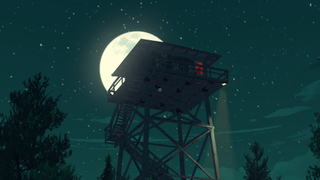Pewdiepie warns against DMCA abuse after YouTube accepts copyright claim against him
The Firewatch controversy continues to burn.

YouTuber Felix Kjellberg, better known to the world as Pewdiepie, kicked off (another) controversy over his use of racist language in a livestream when he dropped the n-word during a PUBG livestream. Sean Vanaman, founder of Firewatch developer Campo Santo, filed a DMCA takedown notice against the streamer in response, saying on Twitter that he was "sick of this child getting more and more chances to make money off of what we make." Yesterday, Pewdiepie put up a new video saying that the copyright strike had gone through, and while he appeared contrite, he also described the move as "an attack on me," and warned that his channel could be shut down if he receives one more.
The video begins with Pewdiepie saying that Let's Plays and their creators exist is a sort of "grey area" with regards to copyright law. That, he claims, is because game developers "benefit massively" from Let's Play videos and livestreams, and so are unwilling to rock the boat. And he's probably correct about it being something of a Faustian pact.
"Minecraft is a billion-dollar title because of streamers—largely because of streamers and YouTubers," he says in the video. "Same thing [with] PUBG, I don't think—it probably would not be even nearly as big without streamers. And developers know this. This is pretty commonly known, and that's why even though, yes, we are making money through your games, it's still seen as something positive."
From there, he shoots a few backhanded comments toward Firewatch, saying that he "quite enjoyed" the game despite listing numerous knocks against it, and then moves on to the legality of the claim against him, noting that there are plenty of arguments both for and against Campo Santo's use of the DMCA in this way. He also points out the studio's own policy regarding streaming, which explicitly states that people are free to stream the game and monetize their videos.
Interestingly, he argues from there that while Campo Santo's copyright claim probably overrides the permissions granted on its website, he doesn't think it can retroactively withdraw that permission from videos that already exist. Despite that, he claims that he privatized his Firewatch video "out of respect" as soon as he saw Campo Santo's tweet about it, but the copyright strike went through anyway, which he said left him "pretty disappointed."
"Whether you like me or Mr. Vanaman, these laws are made for people to take down content and whenever there's power to do so, it's going to be abused. And especially when the reason to take down the content has nothing to do with copyright, it sort of shows that. I think these laws are important for people, for artists to protect [their] work and what they do, and that's why I think it's really dangerous to make these sort of claims and to do these sort of copyright claims for no real valid reason, no matter what you think of me."
"It's important that we don't abuse these laws because they exist to protect artists, not to make any form of censorship or abusive claims."
The biggest gaming news, reviews and hardware deals
Keep up to date with the most important stories and the best deals, as picked by the PC Gamer team.
It's a fair point: It's perfectly understandable that Campo Santo wouldn't want its games to be associated with Pewdiepie, but the DMCA is not (or at least should not be) mean to be used to force content offline simply because copyright holders don't like it. Yet according to the lawyers we spoke to, that appears to be the situation—and that's really not a good situation for anyone.
Andy has been gaming on PCs from the very beginning, starting as a youngster with text adventures and primitive action games on a cassette-based TRS80. From there he graduated to the glory days of Sierra Online adventures and Microprose sims, ran a local BBS, learned how to build PCs, and developed a longstanding love of RPGs, immersive sims, and shooters. He began writing videogame news in 2007 for The Escapist and somehow managed to avoid getting fired until 2014, when he joined the storied ranks of PC Gamer. He covers all aspects of the industry, from new game announcements and patch notes to legal disputes, Twitch beefs, esports, and Henry Cavill. Lots of Henry Cavill.
Most Popular






